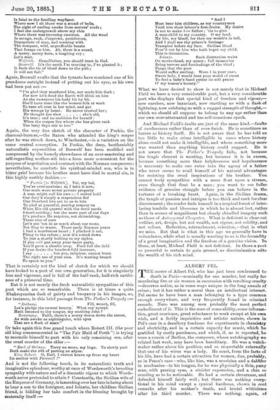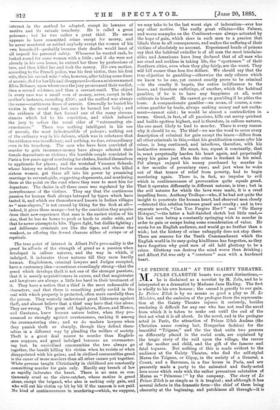ALBERT PE L.
THE career of Albert Pe!, who has just been condemned to death in Paris—nominally for one murder, but really for murdering five or six women in succession with revolting cruelty —deserves notice, as in some ways unique in the long annals of crime ; but it has rather a moral than an intellectual interest. Pel seems to have been a man belonging to a type common enough everywhere, and very frequently found in criminal records. Nero was among men probably the most perfect embodiment of it. This is the man of some ability, some information, great esurience, great reluctance to work except at his own wish, and a feebly inquisitive and artistic nature, shown in Pel's case in a desultory fondness for experiments in chemistry and electricity, and in a certain capacity for music, which he gratified by costly purchases, and which, if, as is reported, he were a cousin of Berlioz, the composer, whose autobiography we related last week, may have been hereditary. He was a watchmaker rather above his position, and so respectable externally that one of his wives was a lady. He must, from the facto of his life, have had a certain attraction for women, due, probably, as in Peace's case—who, like him, was a musician and a dabbler in mechanics—to his tongue, for he was physically a thin, puny man, with peering eyes, a sinister expression, and a chin so receding as to be noticeable. He had a certain cleverness, and defended himself fairly well ; but there was nothing exceptional in his mind except a cynical hardness, shown in cool remarks after his mother's death, and brutal witticisms after his third murder. There was nothing, again, of -interest in the method he adopted, except its lowness of motive and its satanic treachery. He is called a great poisoner; but he was rather a great thief. He never appears to have committed crime except for money, and he never murdered or robbed anybody except the women of his own household—probably because their deaths would least of all imperil his personal safety. Whenever he wanted cash, he looked round for some woman with a little ; and if she were not already in his own house, he enticed her there by professions of love, and then killed her and took the money. His own mother, according to the French police, was his first victim, then his first wife, then his second wife--who, however, after taking some doses of arsenic, fled for her life and disappeared—then a mistress named Eliza Bohmer, upon whose case the jury pronounced their verdict, then a second mistress, and then a servant-maid. The object in every case was a small sum of money, never, except in the mother's instance, exceeding £100; and the method was always the same—continuous doses of arsenic. Generally he buried his victim in the usual way, but once he burned her body ; and the evidence of that fact formed one of the many circumstances which led to his conviction, and which induced the jury to refuse the usual rider of "extenuating cir cumstances." There was nothing intelligent in his use of arsenic, the most indestructible of poisons ; nothing out of the ordinary way in his defence, which was in substance that the evidence was insufficient; and nothing, we fear, extraordinary even in his treachery. The men who have been convicted of murder to gain insurance-money have always selected their female dependants as victims ; the horrible couple convicted in Paris a few years ago of murdering for clothes, limited themselves to applicants for places ; and the wretched Viennese Schenk, whose history we related twelve months since, and who killed sixteen women, got them all into his power by promising marriage to servant-girls, suggesting elopements, and murdering them at the point on the road where they were to meet him for departure. The choice in all these cases was regulated by the powerlessness of the victims. They say that the continuous passion for human flesh always betrayed by tigers which have tasted it, and which are thenceforward known in Indian villages as "man-slayers," is not caused by liking for the flesh at all— indeed, it gives them mange—but by the conviction they acquire from their new experience that man is the easiest victim of his
• size, that he has no horns to push or hoofs to strike with, and that he never attempts to bite. Tigers fight, but dislike fighting ; and deliberate criminals are like the tiger, and choose the weakest, as offering the fewest chances either of escape or of reprisals.
'The true point of interest in Albert Pel's personality is the proof he affords of the strength of greed as a passion when developed in callous natures, and the way in which, if indulged, it indurates those natures till they seem hardly human. Englishmen, criminal lawyers and Judges excepted, have a customary idea—sometimes exceedingly strong—that the greed which develops theft is not one of the stronger passions, that it is merely acquisitiveness in excess, and, that magistrates and lawgivers are always a little too hard in their treatment of it. They have a notion that a thief is the most redeemable of oharacters, and that there is something partly sordid in the zeal with which property is protected, often more carefully than the person. They scarcely understand great bitterness against theft, and almost believe that a thief may have that vice alone. They are wrong. The great old legislators, Moses, and Munoo, and Gantama, knew human nature better, when they pronounced so strongly against covetousness, ranking it among the overmastering sins ; and so do modern lawyers when they punish theft so sharply, though they defend themselves in a different way by pleading the welfare of society. Theft is a great deal nearer to murder than Englishmen suppose, and greed indulged becomes an overmastering lust. In uncivilised communities the two always go together, the bandit killing his victim when he resists or when disappointed with his gains; and in civilised communities greed is the cause of more murders than all other causes put together. White persons taught Christianity in childhood are constantly committing murder for gain only. Hardly any breach of law so rapidly indurates the heart. There is no man so continuously cruel as the slave-catcher, whose motive is greed alone, except the brigand, who also is seeking only gain, and who will out his victim up bit by bit if the ransom is not paid. No kind, of continuousness in murdering—which, we suppose,
we may take to be the last worst sign of induration—ever has any other motive. The really great villains—like Palmer,
and worse examples on the Continent—are always actuated by the hope of gain, which rises in such men to a passion that blinds them to all consequences, and makes the suffering of their victims of absolutely no account. Experienced heads of prisons say that the habitual swindler is of all men the most irreclaimable; and Americans have long declared that of all men who
are cruel and reckless in taking life, the " sportsmen " of their Southern cities, even when they play fairly, are the worst. They will kill sooner than lose five dollars. We should say that the true objection to gambling—otherwise the only offence which we know to be one, yet cannot exactly prove to be criminal —is the cruelty it begets, the entire indifference to the losses, and therefore sufferings, of another, which the habitual gambler, if he is to have any happiness at all, must cultivate in himself. He cannot go on gambling if he pities the loser. A compassionate gambler—we mean, of course, a conscious gambler by trade, always seeking money and not excitement—cannot exist ; he would be almost a contradiction in • terms. Greed, in fact, of all passions, kills out mercy quickest and builds egotism highest, and is therefore, in callous natures, the one most likely to lead to murder. There is every reason why it should be so. The thief—we use the word to cover every description of criminal for gain except the bravo—differs from all other criminals in this,—that his gratification comes after his crime, is long continued, and interferes, therefore, with his instinctive remorse. He must, too, repeat it constantly, that is, must perpetually harden his heart again, and perpetually enjoy his gains just when the crime is freshest in his mind. Pel always enjoyed his money purchased by murder in a few months of pecuniary ease ; and just when he woke out of that trance of relief from poverty, had to begin murdering again. There is, in fact, no impulse to evil which in continuousness of provocation quite equals greed. That it operates differently in different natures, is true ; but in the evil natures for which the laws were made, it is a cruel impelling force. Anthony Trollope—who, if he had not quite the insight to penetrate the human heart, had observed men closely —detected this relation between greed and cruelty ; and in two separate novels, "Can You Forgive Her P" and "Sir Harry Hotspur,"—the latter a half-finished sketch but little read,— his bad men betray a constantly springing wish to murder in order to gain or escape losing some consideration of value. He wrote for an English audience, and would go no further than a wish ; but the history of crime unhappily does not stop there. There are reasons for the Tenth Commandment which the English world in its easy-going kindliness has forgotten, as they have forgotten why good men of old held gluttony to be a crime. Gluttony can destroy the mind worse than drinking ; and Albert Pel was only a " covetous " man with a hardened heart.



































 Previous page
Previous page